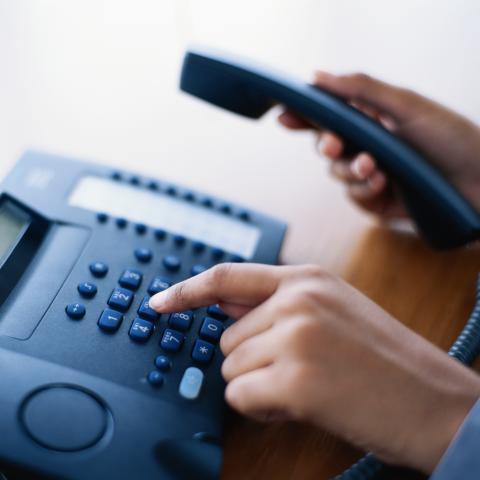
Ever heard of the 7-38-55 communication rule?
The rule says that communication is composed of 7 percent spoken word, 38 percent tone of voice, and 55 percent body language. While this rule is sometimes misconstrued, it’s true that we rely heavily on these subtle clues when communicating.
But on the phone, we’re limited to only 45% of our communication means: spoken word and tone of voice.
This can make it nerve-wracking to get on the phone with a stranger. It’s a style of communication we’re not naturally made for.
And phone calls in a foreign language like Indonesian can be even scarier!
Learning a few Indonesian phone call phrases can help take a lot of this pressure off your shoulders. Once you have the most common words and expressions down, you’ll be a much more effective communicator over the phone and will be able to take most calls with ease.
Below are 30 telephone phrases in Indonesian with two example dialogues.
 Table of Contents
Table of Contents
- Picking up the Phone
- Saying Who You Are
- Stating the Reason for Your Call
- Asking to Speak to Someone
- Asking Someone to Wait
- Leaving a Message
- Asking for Clarification
- Ending the Phone Call
- Sample Phone Conversations
- Conclusion
1. Picking up the Phone

To start with, you’ll want to learn how to pick up the phone in Indonesian and say hi. Considering that Indonesians are rather spontaneous people, you shouldn’t worry too much about your phone greeting.
If you’re talking to a friend or speaking in another informal context, try:
Hello?
Halo?
When it comes to formal contexts, such as calling a restaurant, company, or doctor, it’s preferable to use the following phone call phrase:
Good day.
Selamat siang.
2. Saying Who You Are
When you answer a call in Indonesian from a new number or customer, it’s well worth introducing yourself to the caller after you pick up the phone.
Since lengthy introductions are unnecessary in casual dialogues, you can use the following expression:
This is [name].
Ini [nama].
Are you receiving a call from a customer for your business? Or are you calling a company yourself? Try these phrases:
This is [name] from [company].
Ini [nama], dari [perusahaan].
This is [name], and we’re calling you from [company].
Ini [nama], dan kami memanggil Anda dari [perusahaan].
3. Stating the Reason for Your Call

This will probably be the most difficult part of your conversation, so you’ll want to rehearse this as much as possible before making the call. That way, you can make sure you get your point across and save both you and your caller time.
If you’re calling for a certain request, use the following expression:
I’m calling to ask… / confirm… / make a reservation.
Saya menelepon untuk menanyakan … / mengkonfirmasi … / membuat reservasi.
If you’re looking to talk to a certain person (or want to be forwarded to an English speaker), use this phrase:
I’d like to speak to someone about…
Saya ingin berbicara dengan seseorang tentang…
And last but not least, here’s the expression you’ll want to use when returning a call:
Good morning / day / evening. Did you call earlier?
Selamat pagi / siang / malam. Tadi [Bapak / Ibu] menelepon?
4. Asking to Speak to Someone
Want to be forwarded to someone in particular? Or are you calling your friend’s home phone number and want to talk to him? These phrases will help you do just that…
May I speak to…?
Bolehkah saya berbicara dengan…? (formal)
Bisa bicara dengan…? (informal)
This will be your go-to expression for calling home telephones, as there’s a good chance someone else will be picking up the phone:
Is [name] there?
Apakah [nama] ada?
5. Asking Someone to Wait

Asking someone to wait may sound a bit harsh if you don’t use the right words. That’s why you should memorize a few expressions to get your message across in such situations.
When you don’t want your caller frustrated by long waiting times, let them know that you’re still with them by using the following expressions:
Can you please wait a few minutes?
Bisakah Anda menunggu beberapa menit?
Just a moment, let me check.
Tunggu sebentar, biar aku cek.
Could you hold a moment?
Bisa tunggu sebentar?
Let me transfer you to his office. Stay on the line, please.
Mohon jangan ditutup. Saya akan mentransfer Anda ke kantornya.
6. Leaving a Message

With the growing popularity of SMS and social media, voicemail is slowly becoming outdated. Few people still use this feature on their personal phones. That said, leaving a message for the intended recipient is still relevant in the business world. Below are four expressions to help you do just that.
Please let him know…
Tolong beri tahu dia…
Can I leave a message?
Bisa aku meninggalkan pesan?
Can you tell him to call me back at [phone number]?
Bisakah Anda meminta dia untuk menelepon saya kembali di [nomor telepon]?
How can I leave a note for Mr. / Mrs.?
Bagaimana saya bisa meninggalkan catatan untuk Tuan / Ibu?
7. Asking for Clarification

When talking on the phone in Indonesian, there’s always going to be a moment when you’ll want to ask for clarification, whether it’s due to the traffic noise in the background or due to your lack of language skills.
The connection is weak. Can you please repeat again?
Koneksinya lemah. Bisa tolong ulangi lagi?
Sorry, could you say that again?
Maaf, bisa ucapkan lagi?
I’m sorry, but I’m having a hard time hearing you. I think there’s a bad connection.
Maaf, kurang jelas. Kelihatannya koneksinya jelek.
Sorry, I can’t hear you. Your voice is breaking up.
Maaf, aku tidak bisa dengar. Suaranya putus-putus.
Could you spell your name for me, please?
Bisakah Anda mengeja nama Anda untuk saya?
Just to double-check…
Saya ulang ya… (Literally: “Let me repeat…“)
If your Indonesian is still basic and you want to try switching to English, use the following expression:
Do you speak English?
Apakah Anda berbicara bahasa Inggris?
8. Ending the Phone Call
Depending on the context, there are a few ways you can end a conversation over the phone in Indonesian.
Thank you very much for your call. Let’s catch up soon!
Terima kasih banyak atas panggilan Anda. Ayo segera menyusul!
Anything else I can help with?
Ada lagi yang bisa saya bantu?
You’ve been very helpful. Thank you.
Anda sudah sangat membantu. Terima kasih.
See you at eight p.m. on Wednesday.
Sampai jumpa jam 8 malam pada hari Rabu.
It was nice talking to you.
Senang berbicara denganmu.
9. Sample Phone Conversations
Now that you have several useful phrases to start practicing, it’s time to see how a real-life phone call in Indonesian might sound. Below, we’ve included two sample dialogues for you: one informal and one formal.
Informal phone conversation
Two friends are setting up a time to meet for lunch on a weekend at a local restaurant in Jakarta. Here’s a short conversation they’ve had on the phone.
Eko: Halo.
Annisa: Halo.
Eko: Hello.
Annisa: Hello.
Eko: Apa kabar?
Annisa: Baik. Saya sedang belajar untuk ujian. (Bagaimana dengan) kamu?
Eko: How are you doing?
Annisa: Good. I’m studying for an exam. How about you?
Eko: Saya baik-baik saja, terima kasih. Saya sedang membaca buku.
Annisa: Ohh, begitu.
Eko: I’m good, thanks. I’m reading a book.
Annisa: Oh, I see.
Eko: Kamu berada di kota akhir pekan ini?
Annisa: Iya. Kenapa, kamu punya rencana?
Eko: You’re in town on the weekend?
Annisa: Yes. Why? Do you have any plans?
Eko: Mau makan siang akhir pekan ini?
Annisa: Boleh, kenapa tidak! Kapan?
Eko: Want to go for lunch this weekend?
Annisa: Yeah, why not! When?
Eko: Sore-sorelah…
Annisa: Bisa keluar jam 2 siang?
Eko: In the afternoon…
Annisa: Can you go out at two in the afternoon?
Eko: Saya lebih suka jam 3.
Annisa: Boleh juga.
Eko: I prefer three.
Annisa: Sounds good.
Eko: Kalau begitu, sampai nanti!
Annisa: Sampai nanti!
Eko: See you then!
Annisa: See you then!
Formal phone conversation
After they’ve set the time and place, one of the friends calls the restaurant to reserve a table. Here’s an example of a short phone conversation for this situation.
Eko: Selamat siang!
Resepsionis: Restoran Jakarta – Selamat siang!
Eko: Good day!
Receptionist: Jakarta Restaurant – Good day!
Eko: Saya ingin memesan meja untuk dua orang…
Resepsionis: Baik… Hari ini sudah penuh, tetapi Anda bisa melakukan reservasi untuk besok.
Eko: I would like to reserve a table for two…
Receptionist: Very well… We’re out of tables today, but you can make a reservation for tomorrow.
Eko: Sebenarnya, saya ingin memesan untuk hari Sabtu.
Resepsionis: Tentu. Jam berapa tepatnya?
Eko: Actually, I’d like a table for Saturday.
Receptionist: Sure. What time exactly?
Eko: Tolong jam 3 sore.
Resepsionis: Baik. Atas nama siapa?
Eko: Three in the afternoon, please.
Receptionist: Very well. On whose behalf should I book?
Eko: Eko.
Resepsionis: Baik, Pak Eko. Sampai jumpa akhir pekan!
Eko: Eko.
Receptionist: Perfect, Mr. Eko. See you on the weekend!
10. Conclusion
And that’s it! You now have a good idea of what a short phone conversation in Indonesian looks like.
Memorize enough phone call phrases and you’ll be ready to rock and roll.
It won’t be as embarrassing next time you have to take a call from your Indonesian delivery guy, or when you have to call your doctor in Jakarta for an appointment.
Feel like learning even more phrases and vocabulary?
Then check out IndonesianPod101.
Here, you can find a full range of online lessons designed by native Indonesian language experts.
That includes audio, video, and text content, all incorporated with the latest language learning tools like slowed-down audio, pronunciation comparison tools, online flashcards, word lists, and more.
All of this comes with personalized guidance from a language expert at your disposal.
Access all of these features now by signing up for free (no credit card required) at IndonesianPod101.com.










